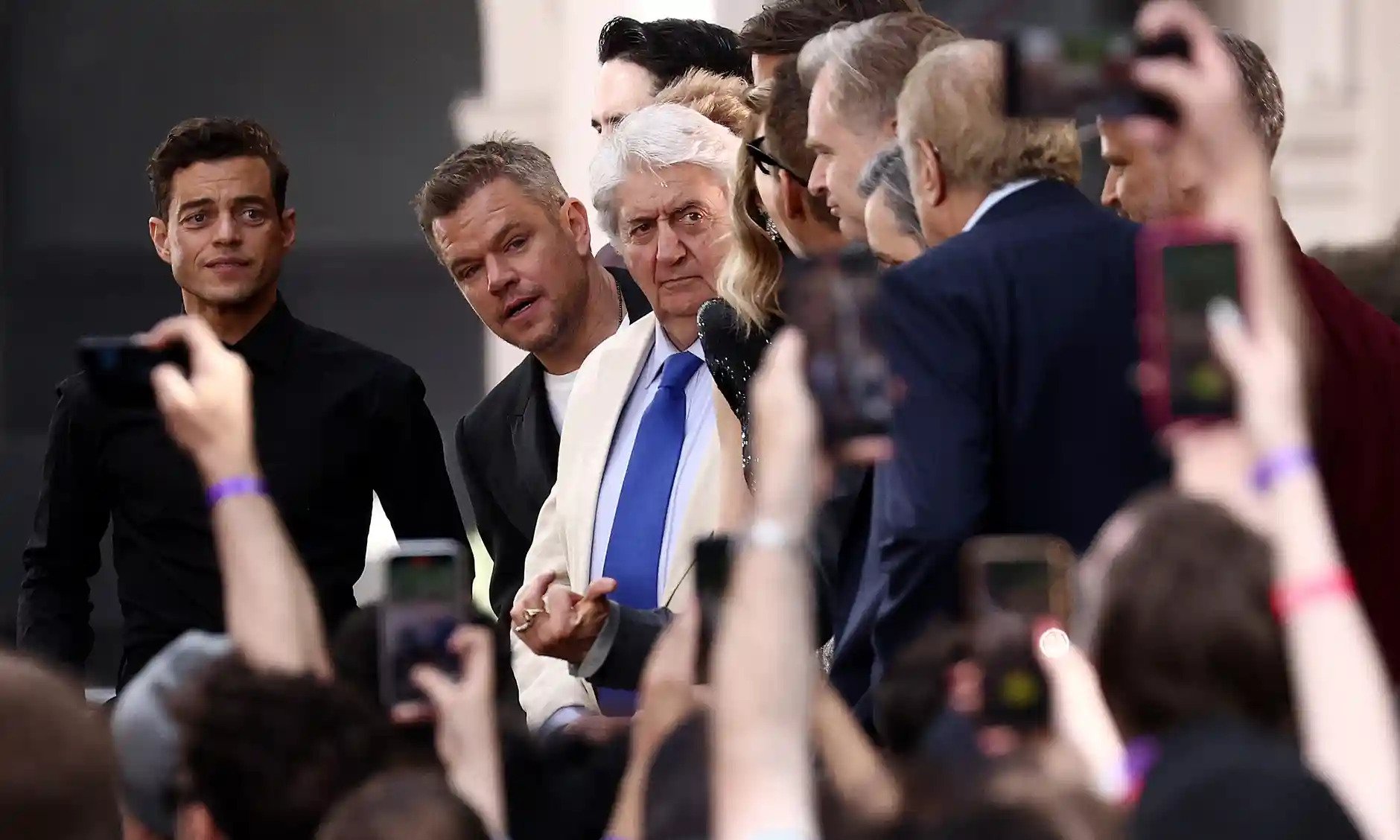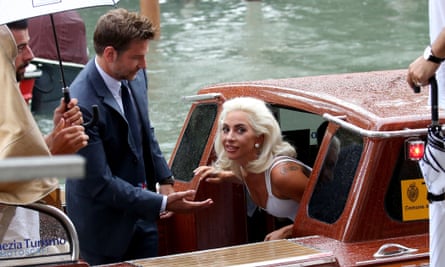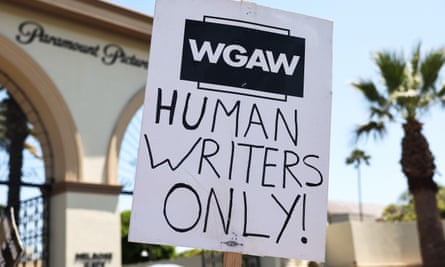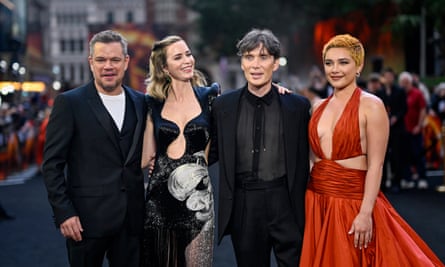Exactly why are they striking, who are the big names aboard, is it all streaming and AI’s fault and when will we see actors on screen again?
 The last hurrah … the cast of Oppenheimer at Thursday’s London premiere, which they exited as the strike began. Photograph: Henry Nicholls/AFP/Getty Images
The last hurrah … the cast of Oppenheimer at Thursday’s London premiere, which they exited as the strike began. Photograph: Henry Nicholls/AFP/Getty Images
Last modified on 2023 Jul 14
–
Who is on strike?
The strike was called on Thursday morning by US actors’ union SAG-AFTRA (which was formed in 2012 after a merger between the Screen Actors Guild and the American Federation of Television and Radio Artists), after the breakdown in negotiations with the AMPTP (Alliance of Motion Picture and Television Producers), which represents the studio bosses. SAG-AFTRA has around 160,000 members: actors in film and TV shows, as well as video game performers, radio presenters, models and YouTube influencers. Technically the union only covers the US, but its Global Rule One demands that members pull out of any production anywhere in the world.
Who is SAG-AFTRA’s firebrand leader?
The union’s president and figurehead is Fran Drescher, who you might remember from 90s TV show The Nanny. Having faced down a modicum of criticism for shooting off to Italy for a photoshoot with Kim Kardashian as negotiations were heading for the rocks, Drescher stormed back with an incendiary speech, in which she poured scorn on studio bosses (“They plead poverty, that they’re losing money left and right when giving hundreds of millions of dollars to their CEOs. It is disgusting. Shame on them.”) and invoked the spirit of the French Revolution: “Eventually, the people break down the gates of Versailles, and then it’s over!”
–
https://media.guim.co.uk/2390595b52716d441ce26c9beff29c72c27edbf6/459_873_3771_2121/1000.jpg
–
Who are the major supporting players?
A preview of the A-listers putting their star-wattage behind the strike came a fortnight ago when a SAG-AFTRA letter expressing willingness to strike was signed by the likes of Meryl Streep, Jennifer Lawrence, Charlize Theron, Joaquin Phoenix, Jamie Lee Curtis, Olivia Wilde and Ewan McGregor. On Friday, George Clooney added his weight to the strike, calling it “an inflection point in our industry”, and saying that change was required for “our industry to survive”. Other big hitters to lend their support over the past 24 hours include John Cusack and Mark Ruffalo. There have been no holdouts – all US actors appear to be on board with the action.
What does SAG-AFTRA want? And why can’t they get it?
One of the union’s main roles is to negotiate terms with the studios: the last major agreement was signed in July 2020 though it was almost immediately undermined by Covid. That agreement was due to expire on 30 June, hence the start of negotiations. One of the main sticking points appears to be residuals, the payments that performers receive for repeat showings of films or TV shows, while the issue of who owns an actor’s likeness if it is reproduced by AI is also a major flashpoint. SAG-AFTRA negotiators are demanding residuals partly based on viewership levels on streaming services but the studios – which include streamers Netflix and Amazon alongside Disney – aren’t willing to share the information.
–
Has streaming changed everything?
Streaming hasn’t just killed the mid-budget movie, or the linear TV series, it’s also changed the way films and shows are presented to their audience, and extract money from them in return. Streamers make money from subscribers, and the shows and films are essentially promos for the subscriptions. Plus they are just up there permanently, with no “repeats” as we would understand them – classic “disruption”, which makes it hard for traditional means of assessing their value in terms of paying people for them. Hence the argument over residuals, made all the harder by the streamers’ reluctance to reveal how many people watch them. As shows and films on streaming platforms become ever larger and more widely watched, then the potential residuals become an ever more significant amount.
What about AI?
Six months ago, no one gave AI a second thought, but that’s how fast things have moved: from zero to an existential threat. Right now, AI-generated imagery doesn’t seem quite sophisticated enough to replace traditional film-making wholesale, but the speed of machine-learning has got everyone worried. The AMPTP said it had offered a “groundbreaking” proposal over AI, but SAG-AFTRA’s chief negotiator Duncan Crabtree-Ireland batted that one away: “They proposed that our background performers should be able to be scanned, get one day’s pay, and their companies should own that scan, their image, their likeness and should be able to use it for the rest of eternity on any project they want, with no consent and no compensation. So if you think that’s a groundbreaking proposal, I suggest you think again.”
I thought actors were rich, though?
Acting is a bit like the sports world: there’s a bunch of big-money headliners, and then the rest, some of whom earn decent money, but most are on nothing like it. These are the people on whose behalf Tom Cruise went ballistic during the Mission: Impossible shoot: “You can tell it to the people that are losing their fucking homes because our industry is shut down! It’s not going to put food on their table or pay for their college education!” Matt Damon reminded reporters of the struggles of most US working actors’ lives: “It’s $26,000 to qualify for health coverage and a lot of people are on the margins and residual payments are getting them across that threshold. This isn’t an academic exercise. This is real life-and-death stuff.”
–
Will they get what they want? How strong are the unions?
The US might be the home of the labor-dispute massacre (about 1,100 deaths since 1850, by Wikipedia’s count) but SAG-AFTRA is likely to pack a powerful punch. For one thing, its leading members are much more visible than those of the writers’ union, the WGA, whose strike began in May. And the disappearance of actors means shooting, the most cash-intensive part of the production process, has to stop immediately. But the knock-on effects of the strike aren’t apparent instantly – this isn’t like refuse or power workers. Both sides are playing a long game: the actors and writers gambling that the product pipeline – already threadbare after Covid – will force the studios back to the table, while the bosses are taking the time-honored route of trying to batter the unions into submission.
What will this mean for the UK?
Equity, the UK actors’ union, has said it will “stand in unwavering solidarity” with SAG-AFTRA, meaning any of its members who hold joint cards will be loath to work if in doubt, and those who don’t will feel uncomfortable if there’s any sense they are taking work from striking colleagues. Beyond that, many productions on these shores are to a greater or lesser extent co-productions. The UK’s biggest studios host major US productions, all of which are now on hold. These include Deadpool 3, which has been filming at Pinewood, Tim Burton’s Beetlejuice sequel, Idris Elba thriller Heads of State and the film version of Wicked. TV shows in production and now under threat are second seasons of Andor and The Sandman, and Eddie Redmayne’s The Day of the Jackal.
https://media.guim.co.uk/347c6ce3427cfdc5f307d13b77e857090e9b5cd6/3_6_1082_608/1000.jpg
–
What are the other immediate effects?
As well as halting most shoots, the small print of SAG-AFTRA’s terms means actors will no longer be able to promote shows and films they have already made. Hence the moving forward by an hour of the start time of Oppenheimer’s London premiere, so its cast could walk the red carpet before the 8pm deadline. The promotional ban extends to social media, with stars now muzzled about their forthcoming work. It also means chatshows will be strikingly light on actors for the foreseeable, and any print or radio interviews scheduled to happen from Friday onwards have been cancelled.

–
What about in the next few months?
The most pressing effect is likely to be on the autumn festivals – Venice, Telluride and Toronto – which start at the end of next month. All three are heavily reliant on star wattage to launch movies hoping for major Oscar action. Yet without A-listers to promote them – making splashy canal entrances, dolled up on the red carpet and talking to reporters – much of the draw of such events will be removed. Venice will need to decide whether it can continue with opening night movie Challengers, for instance, if in-person coverage has to exclusively focus on director Luca Guadagnino rather than stars Zendaya and Josh O’Connor. Other films not officially announced for the autumn festivals will rapidly need to recalibrate their strategies. Michael Mann’s Ferrari film could still screen, but without star Adam Driver. When key roles are combined, the situation is potentially more thorny. Bradley Cooper has written, produced, directed and stars in Leonard Bernstein biopic, Maestro. He could promote the film in his producing and directing capacities but would have to refuse any questions about his script or performance.
–
Topics
–
Related stories
More from Culture
Most viewed
- About us
- Help
- Complaints & corrections
- SecureDrop
- Work for us
- California resident – Do Not Sell
- Privacy policy
- Cookie policy
- Terms & conditions
- Contact us
- All topics
- All writers
- Digital newspaper archive
- YouTube
- Newsletters















